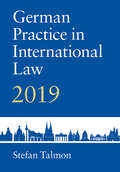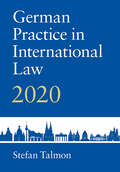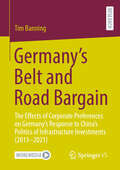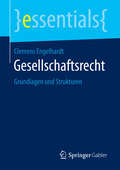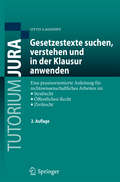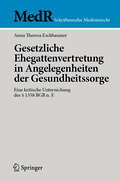- Table View
- List View
German Idealism
by Frederick C. BeiserOne of the very few accounts in English of German idealism, this ambitious work advances and revises our understanding of both the history and the thought of the classical period of German philosophy. As he traces the structure and evolution of idealism as a doctrine, Frederick Beiser exposes a strong objective, or realist, strain running from Kant to Hegel and identifies the crucial role of the early romantics--Hölderlin, Schlegel, and Novalis--as the founders of absolute idealism. Traditionally, German idealism is understood as a radical form of subjectivism that expands the powers of the self to encompass the entire world. But Beiser reveals a different--in fact, opposite--impulse: an attempt to limit the powers of the subject. Between Kant and Hegel he finds a movement away from cosmic subjectivity and toward greater realism and naturalism, with one form of idealism succeeding another as each proved an inadequate basis for explaining the reality of the external world and the place of the self in nature. Thus German idealism emerges here not as a radical development of the Cartesian tradition of philosophy, but as the first important break with that tradition.Table of Contents: Introduction 1. Realism in German Idealism 2. Exorcising the Spirit 3. The Critique of Foundationalism 4. The Troublesome Hegelian Legacy 5. The Taxonomy of German Idealism I. KANT'S CRITIQUE OF IDEALISM Introduction: Kant and the Problem of Subjectivism 1. The Clash of Interpretations 2. Method and Results 3. Contemporary Kant Scholarship 1. Idealism in the Precritical Years 1. The Idealist Challenge 2. The First Refutation of Idealism 3. Idealist Dreams and Visions 4. The Critique of Idealism in the Inaugural Dissertation 5. Skeptical Ambivalence 6. David Hume, Transcendental Realist 2. Transcendental Idealism and Empirical Realism 1. The Case for Subjectivism 2. The First Edition Definitions of Transcendental Idealism 3. Transcendental versus Empirical Idealism 4. Empirical Realism in the Aesthetic 5. Empirical Realism and Empirical Dualism 3. The First Edition Refutation of Skeptical Idealism 1. The Priority of Skeptical Idealism 2. The Critique of the Fourth Paralogism 3. The Proof of the External World 4. A Cartesian Reply 5. Appearances and Spatiality 6. The Ambiguity of Transcendental Idealism 7. The Coherence of Transcendental Idealism 4. The First Edition Refutation of Dogmatic Idealism 1. The Missing Refutation 2. Kant's Interpretation of Leibniz 3. The Dispute in the Aesthetic 4. Dogmatic Idealism in the Antinomies 5. Kant and Berkeley 1. The Göttingen Review 2. Kant's Reaction 3. Berkeleyianism in the First Edition of the Kritik 4. The Argument of the Prolegomena 5. Kant's Interpretation of Berkeley 6. The Small but Real Differences? 6. The Second Edition Refutation of Problematic Idealism 1. The Problem of Interpretation 2. Kant's Motives 3. The Question of Kant's Realism 4. Realism in the Refutation 5. The New Strategy 6. The Argument of the Refutation 7. Outer vis-à-vis Inner Sense 8. Kant's Refutations in the Reflexionen, 1788-93 7. Kant and the Way of Ideas 1. The Theory of Ideas 2. Loyalty and Apostasy 3. The Transcendental versus the Subjective 4. The Question of Consistency 5. The Doctrine of Inner Sense 6. Kantian Self-Knowledge and the Cartesian Tradition 8. The Transcendental Subject 1. Persistent Subjectivism 2. Eliminating the Transcendental Subject 3. The Criteria of Subjectivity 4. The Subjectivity of the Transcendental 5. Restoring the Transcendental Subject 9. The Status of the Transcendental 1. The Problematic Status of the Categories 2. The Metaphysial Interpretation 3. The Psychological Interpretation 4. The Logical Interpretation 5. The Ineliminable Psychological Dimension 6. Problems of Transcendental Psychology 7. Transcendental Psychology and Transcendental Idealism 10. Kant's Idealism in the Opus postumum 1. Kant's Peruke 2. The Gap in the Critical System 3. The Transition Program and Its Implications 4. The Transition and Refutation 5. The Selbstsetzungslehre 6. Appearance of Appe...
German Practice in International Law: 2019
by Stefan TalmonCustomary international law is based on State practice. This book presents the international law practice of Germany, the world's fourth-largest economy and a powerhouse of the European Union. That practice makes an important contribution to the creation and development of customary international law. It is the first and only presentation in English of German practice in the field of international law. The 2019 volume also provides comprehensive coverage of Germany's membership of the United Nations Security Council. The book combines a case study approach, providing analysis and commentary on Germany's practice, with a classic digest of primary materials, including diplomatic correspondence, statements and court decisions. The book is an ideal complement to other compilations of international law practice and is an essential resource for scholars and practitioners of international law. It will also be of interest to scholars of international relations, politics and diplomatic studies.
German Practice in International Law: 2020
by Stefan TalmonCustomary international law is based on State practice. This book presents the international law practice of Germany, the world's fourth-largest economy and powerhouse of the European Union, which makes an important contribution to the creation and development of customary international law. It is the first and only presentation of German practice in international law in English. The book combines a case study approach, providing analysis and commentary on Germany's practice, with a classic digest of primary materials, including diplomatic correspondence, statements, and court decisions. The book is an ideal complement to other compilations of international law practice and is an essential resource for scholars and practitioners of international law. It will also be of interest to scholars of international relations, politics, and diplomatic studies.
The German Prosecution Service
by Shawn Marie BoyneAcclaimed as the "the most objective prosecutors in the world", the German prosecution service has long attracted the attention in the past of comparative law scholars. At first glance, the institutional position and statutory mandate of German prosecutors indicate that that reputation is well-deserved. Unfortunately, the introduction of charge-bargaining has opened the door to criticism that German prosecutors have abandoned their role of objective decision-makers. Using interview data collected from interviews with German prosecutors themselves as well as quantitative data, the book uses the actual voices of German prosecutors to show how real-world constraints, rather than changes in the law, undermine the ability of German prosecutors to objectively seek the truth. The book will take readers behind closed doors where prosecutors discuss case decisions and unveil the realities of practice. As a result, it will critically revise previous studies of German prosecution practices and offer readers a well-researched ethnographic analysis of actual German decision-making practices and the culture of the prosecution service. Unlike prosecutors in America's adversarial system, whom critics claim are driven by a "conviction-mentality" and gamesmanship, German prosecutors are institutionally positioned to function as (at least semi-)judicial officials dedicated to finding a case's objective truth. The book argues that, organizational incentives and norms, rather than the boundaries of the law determinately shapes how prosecutors investigate and prosecute crime in Germany.
Germanistiken: Zur Praxis von Literatur- und Rechtswissenschaft 1630‒1900 (Literatur und Recht #4)
by Claudia LiebHaben die germanischen Götter die Poesie und das Recht erfunden? Kann man einen Text rekonstruieren wie eine Tat? Sind Juristen oder Philologen die besseren Leser? Ist der Wissenschaftler so genial wie der Dichter? ‒ Vor rund 400 Jahren befasste sich eine gelehrte Denkgemeinschaft mit deutschen Texten aus Literatur und Recht. Vor fast 300 Jahren wurden die Spezialisten des deutschen Rechts „Germanisten“ genannt und bald auch die Experten deutscher Literatur. Claudia Liebs Analyse der gemeinsamen Vorgeschichte von Literatur- und Rechtswissenschaft beschreibt erstmals die historischen Verflechtungen von philologischer und juristischer Germanistik.
Germany’s Belt and Road Bargain: The Effects of Corporate Preferences on Germany’s Response to China’s Politics of Infrastructure Investments (2013 – 2021)
by Tim BanningIn recent years, the Belt and Road Initiative (BRI) has not only transformed global trade relations but also tested Germany’s political strategies. This book explores the German Federal Government’s ambivalent response to China’s politics of infrastructure investments under the BRI during Angela Merkel’s tenure as Chancellor, raising crucial questions about Germany’s bilateral relations with China, its economic ambition, and its geopolitical responsibility. This book provides a detailed account of the key political processes and decision points that influenced the Federal Government’s stance towards China’s politics of infrastructure investments. Through its analysis of the interactions between domestic politics and international relations, it aims to offer a nuanced understanding of the complex dynamics between the state and business. It examines how the varying interests of numerous industry sectors impacted the Federal Government’s response to China’s politics of infrastructure investments across multiple policy domains, covering Germany’s policy on foreign investments and foreign trade, its industrial policy, its broader foreign policy, and its role in European politics.
Germany's War and the Holocaust: Disputed Histories
by Omer BartovWhile attempts to come to terms with past catastrophe . . . can help prevent its recurrence, they may also provide arguments for . . . actions against the real or imagined perpetrators of previous disasters. The confrontation with . . . catastrophe can help us understand the roots and nature of this century's destructive urges, as well as humanity's extraordinary recuperative capacities; but it can also legitimize the perpetuation of violence and aggression. -from the Introduction Omer Bartov, a leading scholar of the Wehrmacht and the Holocaust, provides a critical analysis of various recent ways to understand the genocidal policies of the Nazi regime and the reconstruction of German and Jewish identities in the wake of World War II. Germany's War and the Holocaust both deepens our understanding of a crucial period in history and serves as an invaluable introduction to the vast body of literature in the field of Holocaust studies. Drawing on his background as a military historian to probe the nature of German warfare, Bartov considers the postwar myth of army resistance to Hitler and investigates the image of Blitzkrieg as a means to glorify war, debilitate the enemy, and hide the realities of mass destruction. The author also addresses several new analyses of the roots and nature of Nazi extermination policies, including revisionist views of the concentration camps. Finally, Bartov examines some paradigmatic interpretations of the Nazi period and its aftermath: the changing American, European, and Israeli discourses on the Holocaust; Victor Klemperer's view of Nazi Germany from within; and Germany's perception of its own victimhood.
Gerrymandering in America
by Mcgann Anthony J. Smith Charles Anthony Michael Latner Alex KeenaThis book considers the political and constitutional consequences of Vieth v. Jubelirer (2004), where the Supreme Court held that partisan gerrymandering challenges could no longer be adjudicated by the courts. Through a rigorous scientific analysis of US House district maps, the authors argue that partisan bias increased dramatically in the 2010 redistricting round after the Vieth decision, both at the national and state level. From a constitutional perspective, unrestrained partisan gerrymandering poses a critical threat to a central pillar of American democracy, popular sovereignty. State legislatures now effectively determine the political composition of the US House. The book answers the Court's challenge to find a new standard for gerrymandering that is both constitutionally grounded and legally manageable. It argues that the scientifically rigorous partisan symmetry measure is an appropriate legal standard for partisan gerrymandering, as it logically implies the constitutional right to individual equality and can be practically applied.
Gerüchte im Geschäftsleben. Vorbeugen, Entkräften, Widerlegen: Schnelleinstieg für Architekten und Bauingenieure (essentials)
by Mario H. KrausDieses Essential behandelt den Umgang mit Gerüchten im Geschäftsleben, wie sie etwa im Umfeld von umstrittenen Sanierungs- und Bauvorhaben kursieren können: Es gibt dafür keine Patentrezepte, vielmehr ist jeder Fall gesondert und ganzheitlich zu betrachten; es gilt Ursachen und Auswirkungen ins Verhältnis zu setzen.
Geschäftsführer im Konzern: Aufgaben, Geschäftsführerverträge, Rechte und Pflichten
by Lothar VolkeltDer Geschäftsführer im Konzern steht nicht nur in seiner Führungsrolle im Fokus. Auch seine (rechtliche) Verankerung im Unternehmen ist anspruchsvoll in der Regelung. Das Werk erläutert praxisnah alle wichtigen Fragen.
Geschäftsführer im Konzern: Aufgaben, Geschäftsführerverträge, Rechte und Pflichten
by Lothar VolkeltDer Geschäftsführer im Konzern steht nicht nur in seiner Führungsrolle im Fokus. Auch seine (rechtliche) Verankerung im Unternehmen ist anspruchsvoll in der Regelung. Das Werk erläutert praxisnah alle wichtigen Fragen.
Geschäftsmodell Nachhaltigkeit: Ökologische und soziale Innovationen als unternehmerische Chance
by Klaus-Michael AhrendDieses Praxishandbuch vermittelt, neben den theoretischen Grundlagen für die Bewertung von Nachhaltigkeit, eine positive Haltung zu ökologischen und sozialen Geschäftsmodellen. Nachhaltigkeit ist dabei mehr als eine gesellschaftliche Anforderung oder eine philanthropische Erwägung. Vielmehr ist sie eine unternehmerische Chance für Neugründungen und für etablierte Unternehmen. Für beide Zielgruppen stellt dieses Buch einen integrierten Ansatz für die Entwicklung von nachhaltigen Geschäftsmodellen bei Neugründungen und bei etablierten Unternehmen zur Verfügung. Mit über 1.600 Beispielen nachhaltiger Geschäftsmodelle aus verschiedenen Branchen wird es zu einem wichtigen Berater für jede Unternehmerin und jeden Unternehmer. In der aktualisierten Neuauflage wurden neben zahlreichen weiteren Beispielen nachhaltiger Geschäftsmodelle auch Interviews mit Vertreterinnen und Vertretern des Zentrums für nachhaltige Wirtschafts- und Unternehmenspolitik der Hochschule Darmstadt (ZNWU) ergänzt.
Geschlechterfragen im Recht: Interdisziplinäre Überlegungen (MedR Schriftenreihe Medizinrecht)
by Magdalena Januszkiewicz Alina Post Alexander Riegel Luisa Scheideler Alisha TreutleinDieses Buch enthält interdisziplinäre Beiträge zum Thema Geschlecht und widmet sich schwerpunktmäßig dem aktuellen Thema der Trans- und Intergeschlechtlichkeit. Nach einem einführenden rechtshistorischen Beitrag wird die Geschlechterfrage aus kirchenrechtlicher Sicht beleuchtet. Ergänzt wird die Thematik durch einen Beitrag über Straftaten gegen die sexuelle Selbstbestimmung. Weitere Beiträge behandeln die Trans- und Intergeschlechtlichkeit aus medizinischer, verfassungsrechtlicher und zivilrechtlicher Perspektive und zeigen Reformbedarf in diesem Bereich auf.
Gesellschaftsphänomen E-Sport: Erklärungs- und Forschungsbeiträge aus einer interdisziplinären Perspektive (Angewandte Forschung im Sport)
by André Schneider Thomas WendebornDieser Sammelband bietet eine interdisziplinäre Sicht auf das Phänomen E-Sport. Die Autorinnen und Autoren gewähren mit den zahlreichen Erklärungs- und Forschungsbeiträgen zum E-Sport nicht nur tiefgreifende Einsichten, sondern liefern zugleich auch wertvolle Erkenntnisse für die Praxis. Damit richtet sich das Werk an Forschende und Studierende der Rechts-, Wirtschafts-, Sport- und Ingenieurwissenschaften sowie Praktiker von Profit- und Non-Profit-Organisationen aus dem Bereich der Wirtschaft, des Sports, der Politik und der Kultur.
Gesellschaftsrecht: Grundlagen und Strukturen (essentials)
by Clemens EngelhardtIn diesem essential werden die Grundlagen des Gesellschaftsrechts kurz und #65533;bersichtlich aufbereitet. Dabei werden die in Deutschland #65533;blichen Rechtsformen GmbH, Aktiengesellschaft, BGB-Gesellschaft (GbR) sowie GmbH & Co. KG hinsichtlich Gr#65533;ndung, Kapital, Corporate Governance und Ver#65533;u#65533;erung beleuchtet. Ihre jeweiligen Besonderheiten werden hervorgehoben: Wer handelt, wer tr#65533;gt Verantwortung, wer haftet in welcher H#65533;he f#65533;r Verbindlichkeiten? Grafische Darstellungen veranschaulichen die Strukturen und Abl#65533;ufe. Der Leser erf#65533;hrt, welche Gesellschaft f#65533;r welchen wirtschaftlichen Zweck sinnvoll und hilfreich ist.
Gesetzestexte suchen, verstehen und in der Klausur anwenden
by Otto LagodnyDass "fast alles im Gesetz steht", verblüfft Studierende bei Klausurbesprechungen immer wieder. Dabei ist das Gesetz das Werkzeug aller Juristen und bei Klausuren bis zum ersten Staatsexamen das einzige zugelassene Hilfsmittel. Der Autor vermittelt Studienanfängern an Beispielen aus dem Strafrecht, dem Bürgerlichen Recht und dem Verfassungsrecht, wie man Gesetze richtig liest: d. h. unübersichtliche Normen versteht, einschlägige Vorschriften schnell findet, Inhalte richtig anwendet und juristisch argumentiert. Mit Übungen und Wiederholungsfragen.
Gesetzestexte suchen, verstehen und in der Klausur anwenden: Eine praxisorientierte Anleitung für rechtswissenschaftliches Arbeiten im Strafrecht, Öffentlichen Recht, Zivilrecht (Tutorium Jura)
by Otto LagodnyDass „fast alles im Gesetz steht“, verblüfft Studierende bei Klausurbesprechungen immer wieder. Dabei ist das Gesetz das Werkzeug aller Juristen und bei Klausuren bis zum ersten Staatsexamen das einzige zugelassene Hilfsmittel. Der Autor vermittelt Studienanfängern an Beispielen aus dem Strafrecht, dem Bürgerlichen Recht und dem Verfassungsrecht, wie man Gesetze richtig liest: d. h. unübersichtliche Normen versteht, einschlägige Vorschriften schnell findet, Inhalte richtig anwendet und juristisch argumentiert. Mit Übungen und Wiederholungsfragen.
Gesetzlich nicht normierte ärztliche Auskunfts- und Offenbarungspflichten
by Nikolaus Von BarDieses Buch zeigt auf, wann Ärzte entgegen ihrer Schweigepflicht zur Mitteilung von Patientengeheimnissen verpflichtet sind. Nach derzeit geltender Rechtslage dürfen Ärzte in Einzelfällen ihre Schweigepflicht zum Schutz eines höherwertigen Rechtsgutes brechen. Das zu schützende Rechtsgut muss in der konkreten Situation gegenüber dem allgemeinen Persönlichkeitsrecht des Patienten überwiegen und dem zu schützenden Rechtsgut muss eine Gefahr drohen. Es obliegt grundsätzlich dem einzelnen Arzt darüber zu entscheiden, ob er den drohenden Schaden für das höherwertige Rechtsgut abwendet. Nicht zuletzt nach dem Absturz der Germanwingsmaschine im März 2015 kam die Diskussion darüber auf, ob Ärzte nicht viel häufiger dazu verpflichtet sein sollten, ihre Schweigepflicht zu brechen, um Dritte vor Schäden zu schützen.Der Verfasser dieses Werkes legt verschiedene zivilrechtliche Grundsätze dar, aufgrund derer Ärzten nicht nur das Recht, sondern die Pflicht zukommt, Patientengeheimnisse zu offenbaren. Diese allgemeinen Grundsätze werden an verschiedenen Fallgruppen angewendet. Wann ist ein Arzt beispielsweise dazu verpflichtet, einem Dritten die AIDS-Erkrankung eines Patienten mitzuteilen? War der Arzt des Piloten der abgestürzten Germanwingsmaschine dazu verpflichtet, die Depressionserkrankung des Piloten Dritten mitzuteilen? Haben Eltern ein Recht darauf, von einem Arzt zu erfahren, ob ihre minderjährige Tochter schwanger ist? Können Ärzte dazu verpflichtet sein, Prädispositionen für letale Erbkrankheiten an ihre Patienten zu offenbaren und haben diese ein Recht darauf, einer solchen Mitteilung aus dem Weg zu gehen? Und in welchen Fällen müssen Ärzte Kindern anonymer Samenspender die Identität ihrer biologischen Väter mitteilen? Diese Fragen werden in dem vorliegenden Buch – auch für Mediziner verständlich - beantwortet.
Gesetzliche Ehegattenvertretung in Angelegenheiten der Gesundheitssorge: Eine kritische Untersuchung des § 1358 BGB n. F. (MedR Schriftenreihe Medizinrecht)
by Anna Theresa EschbaumerDieses Buch beinhaltet eine ausführliche und kritische Untersuchung des mit dem Gesetz zur Reform des Vormundschafts- und Betreuungsrechts vom 4.5.2021 neu in das BGB eingeführten gesetzlichen Ehegattenvertretungsrechts in Angelegenheiten der Gesundheitssorge (in Kraft seit 1.1.2023). Basierend auf einer umfangreichen Auslegung der einzelnen Regelungsaspekte des § 1358 BGB n. F. (etwa Anwendungsbereich und Umfang der Befugnisse, aber auch das Verhältnis zu weiteren Rechtsinstituten zur Vertretung in Gesundheitsangelegenheiten) werden konzeptionelle Defizite des § 1358 BGB n. F. herausgearbeitet und damit einhergehende Probleme – rechtlicher als auch praktischer Natur – identifiziert. Weiterhin ist Gegenstand der Untersuchung, ob und inwieweit etwaige Unklarheiten und Schwächen der Neuregelung durch sorgfältige – ggf. verfassungskonform auszugestaltende – Auslegung reparabel sind. Schließlich werden Reaktionsmöglichkeiten des Gesetzgebers zum weiteren Verfahren mit der Norm aufgezeigt. Leserinnen und Leser erhalten einen umfassenden Überblick über das neue Ehegattenvertretungsrecht in dem grundrechtsintensiven Bereich der Gesundheitssorge und werden für die Herausforderungen im Zusammenhang mit der Anwendung des § 1358 BGB n. F. sensibilisiert. Das Buch richtet sich damit nicht nur an die juristische Leserschaft, sondern auch an Rechtsanwenderinnen und -anwender sowie an interessierte von der Neuregelung Betroffene – sowohl auf Behandlungs- als auch auf Patientenseite.
Gesetzliche Schuldverhältnisse (Springer-Lehrbuch)
by Marco StaakeDas Lehrbuch bietet eine Einführung in eines der Kerngebiete des Zivilrechts: die gesetzlichen Schuldverhältnisse. Das Gebiet wird anhand zahlreicher Beispielfälle beleuchtet, welche jeweils mit vertiefenden Hinweisen versehen sind. Daher eignet sich der Band sowohl für einen ersten Einstieg in die Rechtsmaterie als auch zum Nachschlagen und Wiederholen des Stoffs.
Gesundheit und Wirtschaftswachstum
by Stephan Meyer Mattias G. FischerDer Schutz der Gesundheit verlangt medizinischen Fortschritt. Allerdings werden damit verbundene Ausgabensteigerungen häufig als Fehlentwicklung wahrgenommen. Autoren aus Rechts- und Wirtschaftswissenschaft, Medizinethik sowie medizinischer und juristischer Praxis stellen diese Sichtweise auf den Prüfstand. Sie fragen nach den volkswirtschaftlichen Wachstumseffekten eines innovationsfreundlichen Gesundheitssystems, nach der Zahlungsbereitschaft der Versicherten und dem Stellenwert des Gutes Gesundheit aus Sicht der Bevölkerung.
Get an Ethical Life: Flash
by Mac BrideGet an Ethical Life is a short, simple and to-the-point guide to the basic principles behind ethical, sustainable living, in a few short steps. Even if you are completely new to this way of life, in just 96 pages you will discover some essential ideas and strategies that will make a huge difference if you want to live a more sustainable, balanced life - without having to spend months learning how.
Get an Ethical Life: Flash
by Peter MacBrideGet an Ethical Life is a short, simple and to-the-point guide to the basic principles behind ethical, sustainable living, in a few short steps. Even if you are completely new to this way of life, in just 96 pages you will discover some essential ideas and strategies that will make a huge difference if you want to live a more sustainable, balanced life - without having to spend months learning how.
Get It Together
by Melanie CullenGet your life organized with the best workbook available! Paperwork and personal information isn't always easy to find, and organizing your records can seem like an intimidating task. But, whether you need to organize records for yourself, your family or your executor, Get It Together will show you how to keep track of: . instructions for survivors . secured places and passwords .final arrangements . estate planning documents . employment records . insurance policies . tax records . retirement accounts . government benefits, and . real estate records. This workbook provides a complete system for structuring a records binder and easily organizing it for your loved ones. This edition is easier to use than ever, with fully updated resources and references. - Download forms for book on nolo.com
Get It Together: Organize Your Records So Your Family Won't Have To
by Melanie Cullen Shae IrvingGet your life organized with the best workbook available! Paperwork, personal information, and passwords aren't always easy to find, and organizing your records can seem like an intimidating task. But, whether you need to get a handle on records for yourself, your family or your executor, Get It Together will show you how to organize: instructions for survivors secured places and passwords estate planning documents funeral arrangements employment records insurance policies tax records retirement accounts government benefits real estate records and more. For those concerned about sensitive information like passwords, Get It Together lets you: Securely store an unlimited number of passwords while keeping them handy. Decide whether you want to record your information electronically or by hand. Choose the way you want to organize your passwords--for example, alphabetically or by type of product or service. Easily add related notes, such as security questions. This workbook provides a complete system for structuring and organizing your information and documents into a records binder. For each topic, you will find helpful content, rich resources and step-by-step instructions. All forms are downloadable through a link printed in the book.

